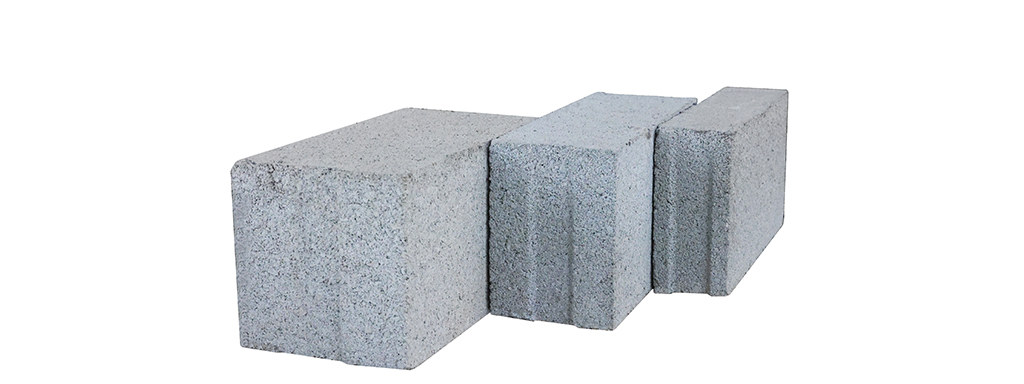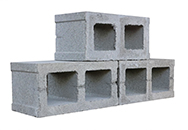Products
CONCRETE BLOCKS
WHY CONCRETE BLOCKS
- Concrete blocks are a versatile masonry material which can be used in a wide variety of applications.
- These blocks are produced in our mass production lines which allow homeowners and contractors to purchase them immediately and have them delivered or picked up ready for installation.
- Concrete blocks are an inexpensive building material which can save homeowners thousands in expenses.
- They are a great alternative to natural stone blocks.
- These blocks are available in many different sizes and designs and can also be assembled in many different patterns.
THE CONCRETE BLOCK PRODUCTS
- Solid
- Hollow
- Interlocking
| Type | Size | Weight | Packing | Compressive Strength |
|---|---|---|---|---|
| Block 9 x 9 | 390 mm x 190 mm x 190 mm | 25 Kg | Per Piece | Load Bearing 5.6N/mm2 – 7N/mm2 (KS 02 – 625) Non Load Bearing 2.8N/mm2 – 3.5N/mm2 (KS 02 – 625) |
| Block 9 x 9 | 390 mm x 190 mm x 190 mm | 25 Kg | Per Piece | |
| Block 6 x 9 | 390 mm x 140 mm x 190 mm | 20 Kg | Per Piece | |
| Block 4 x 9 | 390 mm x 90 mm x 190 mm | 12 Kg | Per Piece |
Interlocking blocks
Interlocking concrete blocks also do not use a mortar for installation. A typical interlock concrete block will have a lip or lug at the bottom of it. As each course is laid the blocks interlock with one another and create a strong and durable structure. The style and method of application will generally depend on the type of application. Building structures are always recommended to be installed by the mortar method. Garden and landscaping applications can use interlocking and dry stack methods.
| Type | Size | Weight | Packing | Compressive Strength |
|---|---|---|---|---|
| Interlocking Block 9 x 9 | 490 mm x 190 mm x 180 mm | 24.95 Kg | Per Piece | Non Load Bearing 2.8N/mm2 – 3.5N/mm2 (KS 02 – 625) |
| Interlocking Block 6 x 9 | 490 mm x 140 mm x 180 mm | 19.5 Kg | Per Piece |
Hollow blocks
Another installation method for concrete blocks is the dry stack method. Sometimes hollow blocks are used for this type of method. The blocks are laid course by course without mortar. As a course is laid the finished course of blocks should be filled with a backfill material like crushed stone or gravel. The back fill helps the structure to become stable.
Hollow-Max Span
Is a type of concrete block used for construction of suspended floor slab with advantages including:
- Reduced dead weight for the building thus reducing the cost
- Reduction of concrete volume
- Insulation improvement
- Sound improvement
All our concrete classes are manufactured to Kenyan standards and EN standards
| Type | Size | Weight | Packing | Compressive Strength |
|---|---|---|---|---|
| Hollow Block Max Span | 380 mm x 230 mm x 230 mm | 18 kg | Per Piece | Non Load Bearing 2.8N/mm2 – 3.5N/mm2 (KS 02 – 625) |
| Hollow Single | 380 mm x 230 mm x 230 mm | 18 kg | Per Piece | |
| Hollow Block 9 x 9 for wall | 390 mm x 190 mm x 190 mm | 14 kg | Per Piece | |
| Hollow Block 6 x 9 for wall | 390 mm x 190 mm x 140 mm | 14 kg | Per Piece |
Residential customers can pick up aggregates with their own trucks with different capacities.
Get Concrete Blocks delivered directly to your jobsite:
INSTALLATION
This type of block material is generally installed with a mortar. Before installation begins a solid foundation should be set to a depth according to the style and type of installation. As each course of concrete block is laid cement based mortar should be smoothened to the concrete block as it is applied. The mortar works by bonding each concrete block together and ensuring the structure is stable and well established as a singular unit. Mortar can be applied with a trowel. Different types of mortar are available so it may be wise to seek professional advice on the best mortar to suit the concrete block application.
TYPES OF CONCRETE BLOCKS
Concrete blocks are available in non-load bearing and load bearing types.
APPLICATIONS
Concrete blocks are versatile; they can be used for many different types of applications whether the application is load bearing, structural or decorative.
Here is a list of common concrete block applications:
- Retaining Walls
- Siding
- Veneer
- Building Homes
- Commercial Properties
- Steps
- Landscaping Garden Beds
- Curbing and Edging
- Solid blocks
P.O. BOX 919-40100, Kisumu,
Kisumu Miwani Road, Kisumu








